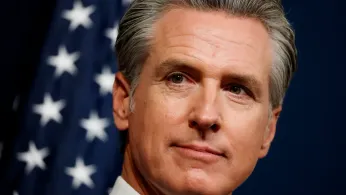
Oct 28
Gavin Newsom’s Evolving Record on Queer Rights: From Allyship, to Controversy, and the Road Ahead
READ TIME: 4 MIN.
Gavin Newsom’s reputation as a progressive ally to the LGBTQ+ community was cemented in 2004, when he, as mayor of San Francisco, ordered the city to issue marriage licenses to same-sex couples—defying federal law and sparking a national conversation about marriage equality . This bold move contributed to the legal and cultural momentum that ultimately led to nationwide legalization of same-sex marriage in 2015. During his tenure as governor, Newsom has signed legislation expanding civil rights protections for LGBTQ+ Californians, including workplace anti-discrimination laws, adoption rights, and hospital visitation protections .
Evan Low, former assemblymember and CEO of the LGBTQ+ Victory Fund, highlights Newsom’s coalition-building approach: “He helped secure marriage equality in the state as well as civil rights protections for adoption, hospital visitation, and the workplace. All of these things happened because we were able to build bridges and coalitions” .
In June 2025, Newsom issued a proclamation declaring LGBTQ+ Pride Month, reaffirming California’s commitment to supporting and celebrating the lesbian, gay, bisexual, transgender, and queer community. His proclamation condemned the wave of anti-LGBTQ+ legislation nationwide and highlighted the disproportionate violence faced by transgender people, especially Black transgender women . He emphasized, “The LGBTQ community has fought tirelessly for their very right to exist and to be treated with the respect and equality that everyone deserves. But their fight is far from over” .
Despite a track record of support, Newsom has faced intense criticism for recent comments and policy positions on transgender rights, particularly regarding sports participation. In March 2025, Newsom appeared on his podcast with conservative activist Charlie Kirk and stated it was “deeply unfair” for trans women and girls, including K-12 student athletes, to compete in women’s sports leagues . On KQED’s Political Breakdown, Newsom reiterated his belief that trans girls—even those as young as five—should be excluded from leagues consistent with their gender identity, citing fairness . He explained, “I agree on the issue of fairness in that respect, that it is unfair in these circumstances, and I haven’t been able to reconcile it” .
These comments shocked many LGBTQ+ athletes and advocates, who argue that excluding transgender people from sports perpetuates stigma and discrimination . The scientific consensus on the alleged athletic advantage of transgender women is far from settled, and leading medical organizations support inclusive policies .
Newsom’s recent vetoes of key transgender rights bills have drawn sharp criticism from LGBTQ+ organizations and lawmakers. In September 2025, he vetoed a bill that would have required California courts to consider a parent’s views on LGBTQ+ rights during custody disputes. Newsom argued the bill might “dictate—in prescriptive terms that single out one characteristic—legal challenges” for judges .
In October 2025, he vetoed SB 418, which would have allowed trans people and anyone on hormone medication to maintain a 12-month supply of their medication. The bill was designed to protect transgender Californians from disruptions in access to hormone therapy, amid federal attacks on gender-affirming care. Newsom justified the veto by citing potential increases in healthcare costs, a claim contested by advocates and healthcare experts who noted that hormone therapy is among the least expensive forms of prescription medication . State Senator Caroline Menjivar, who authored SB 418, described the veto as “heartbreaking,” saying it left trans Californians vulnerable at a time of extreme federal attacks .
Craig Pulsipher, legislative director for Equality California, responded: “The data and analysis on this bill show that the impact on health insurance premiums would be negligible. The governor’s decision leaves trans Californians and many others who rely on hormone therapy vulnerable to treatment disruptions” .
Advocates and community members are divided on Newsom’s overall legacy. While some emphasize his long-standing support and major victories for LGBTQ+ rights, others point to his recent actions as evidence of an inconsistent commitment—especially as anti-LGBTQ+ sentiment rises nationally.
Evan Low notes, “He has that track record and that history and that should not be lost on members of the community” . Yet, for many transgender Californians, the vetoes and public statements feel like a step backward, undermining trust and security in a state that has often led the way on LGBTQ+ rights .
As Newsom weighs a potential run for president in 2028, activists and analysts are scrutinizing his record on LGBTQ+ and transgender issues. His vocal opposition to federal anti-LGBTQ+ policies and condemnation of hate crimes is seen as vital in the current political climate . However, his recent positions on sports and health care access have introduced uncertainty regarding how he would navigate transgender rights on the national stage .
For many in the LGBTQ+ community, the stakes are high: California’s policies have often served as a model for the rest of the country. Newsom’s decisions signal the challenges and complexities ahead, both for his political future and for the ongoing struggle for transgender equality in the United States .
Gavin Newsom’s record on LGBT and transgender rights reflects both progress and persistent controversy. While his leadership on marriage equality and civil rights is undeniable, recent vetoes and statements have raised urgent questions about the future of transgender protections in California and beyond. As Newsom’s national profile grows, the debate over his legacy continues—illuminating the ongoing struggle for inclusive, equitable policies for all LGBTQ+ people.






